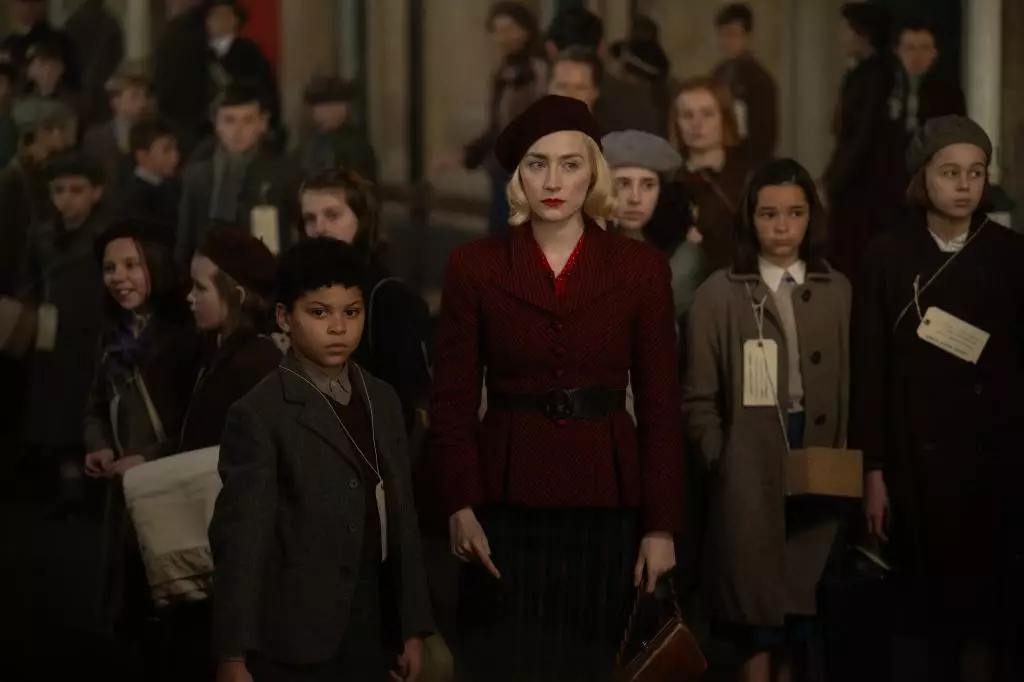Director Steve McQueen’s narrative feature film *Blitz* immerses viewers in the chaotic landscape of wartime London during the German Blitzkrieg, presenting the harrowing juxtaposition of innocence against the backdrop of destruction. Following his documentary *Occupied City*, which dealt with the Nazi occupation of Amsterdam, McQueen shifts the lens to a different yet equally devastating period in history. Through the eyes of a young biracial boy named George, played by newcomer Elliot Heffernan, the film invites us to experience the horrors of war from an innocent perspective, challenging audiences to grapple with the human impact of conflict and what it means to survive amidst profound chaos.
The film opened the London Film Festival with a resonant impact and is set to premiere in North America at the prestigious New York Film Festival later this month. With its theatrical release scheduled for November 1 and a streaming debut on Apple TV+ on November 22, *Blitz* has positioned itself not just as a historical account but as a poignant narrative exploring themes of family, resilience, and the sanctity of childhood in times of war.
Central to McQueen’s poignant storytelling is the character of George, whose journey through the turbulent Blitz period is both heartbreaking and redemptive. The narrative begins with a gripping bombing sequence, accentuating the fear and uncertainty that permeated British life during this time. As George’s family—made up of his mother Rita, portrayed by the talented Saoirse Ronan, and his grandfather Gerald—navigates daily life in this war-torn environment, the external chaos serves to highlight the internal struggles faced by children like George, who grapple with feelings of isolation and fear.
Throughout the film, we are introduced to key relationships that help frame George’s world. Rita is shown as a resourceful munitions factory worker, faced with the dual challenges of keeping her family safe while contributing to the war effort. The scenes depicting her emotional performance on a BBC radio show offer a glimpse into the human spirit’s endurance amidst despair. This nuance in Ronan’s performance adds depth to the character, portraying a mother’s love as both a source of strength and vulnerability.
In stark contrast to Rita’s established life, George embodies the unresolved turmoil of a child thrust into a situation he cannot fully comprehend. He is caught in a cycle of bullying at school for being biracial, leading to his eventual decision to escape from safety in search of belonging. This theme of haunting isolation, distinctly outlined in George’s predicament, cannot be overlooked. McQueen addresses social dynamics and racism prevalent at the time, which adds another layer of complexity to his narrative.
As the narrative unfolds, George’s narrative parallels the trials of Dickensian protagonists, filled with adventures both humorous and deeply troubling. For George, the city becomes a character in itself—a labyrinthine expanse fraught with danger and discovery. His encounters with diverse characters, such as the air-raid warden Ife, played by Benjamin Clementine, and a band of youthful looters, expose him to the grim reality faced by those struggling for survival. This character arc is marked by George’s desperate attempts to return home, highlighting childhood resilience against overwhelming odds.
The film successfully oscillates between the perilous adventures of George and the anguish of his mother Rita, who is left frantic when she realizes her son has gone missing. This poignant duality is masterfully crafted, as McQueen intertwines moments of suspense with emotional depth, reflecting both the chaos of London during the Blitz and the longing for family that resonates profoundly across time.
Visually Striking Depictions of War
McQueen collaborates with an impressive production team to construct a visually captivating representation of life during the Blitz. From the cinematography of Yorick Le Saux to Hans Zimmer’s evocative score, the film immerses viewers in the sights and sounds of war-torn London. The audience is drawn into a world marked by contrasting elements—vibrant club scenes juxtaposed with the desolation of bombed buildings. Such artistic decisions serve to heighten emotional engagement, allowing for a gripping experience that resonates on multiple levels.
As with any historical narrative, *Blitz* finds itself resonating deeply in contemporary contexts. In light of recent global conflicts, the film’s reflection on the experiences of children in war serves as a haunting reminder of the cycles of violence that echo throughout history. McQueen’s inspiration rooted in a photograph of a boy in wartime propels the narrative and infuses it with a sense of urgency and relevance that transcends the boundaries of its setting.
A Story That Transcends Time
*Blitz* exemplifies how film can serve as a powerful medium for exploring the intricacies of human experiences during turbulent times. McQueen’s keen eye for detail and emotional storytelling merges the past with present narratives, compelling audiences to confront the realities faced by children in wartime. As George’s journey unfolds, it not only highlights the resilience and fragility of youth in the shadows of destruction but also reinforces that amidst tragedy, there is always hope for re-connection, healing, and the enduring spirit of family. Ultimately, *Blitz* stands not merely as a historical retelling but as an evocative exploration of humanity’s capacity to endure.
